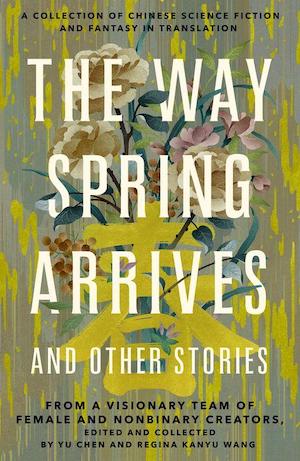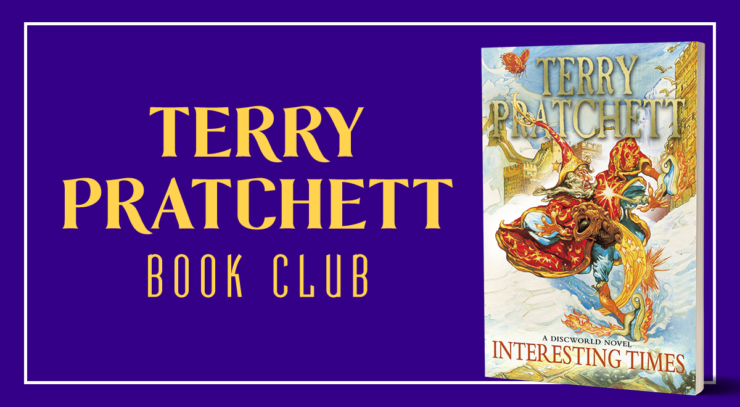Somebody give Rincewind a potato. Please. He just needs some mashed potatoes.
Summary
The Lady and Fate are about to play a game called Mighty Empires. The Lady makes her first move with a butterfly that unfolds its wings. Lord Vetinari asks to see Archchancellor Ridcully because he’s received an albatross from the Counterweight Continent, their first message in quite some time. They’ve demanded the “Grand Wizzard,” and Vetinari wants the wizards to take care of the request by teatime. Ridcully is certain he’s seen that spelling of “wizzard” before, but can’t put his finger on where. He heads back to the University and calls a meeting to decide how to tackle the issue. The Librarian remembers that “wizzard” was the label on Rincewind’s old hat. Rincewind is currently on a serene little island (where he has been since the events of Eric, the past several months), catching seafood and avoiding being eaten by sharks thanks to the Luggage’s interference. Ridcully insists that they go about finding Rincewind, having no preconceived notions about him because he wasn’t involved in any of the man’s previous misadventures, having not been Archchancellor at the time.
Buy the Book


The Way Spring Arrives and Other Stories
Ponder uses a device called Hex to summon Rincewind the necessary distance (just as he’s being propositioned by Amazons, but he believes they are about to give him potatoes), and he promptly staggers into the street, horks down three of Dibbler’s sausages in buns, gets knocked about by the thieves doing their guild training, then staggers back to the University to get his hat from the Librarian. Lord Hong, from the Counterweight Continent, is a perfect sort of man, who has summoned the “Great Wizzard” to give an opposing army someone to follow—he is quite certain this man is a fool and will result in their doom. Rincewind wakes up the next day to hear the wizards arguing about what to do with him: Ridcully has determined that he’s the right man to send after the message because, as the rest of the faculty have pointed out, he’s survived a great deal. He tells Rincewind that they’ll execute him for pretending to be a wizard when he never passed his exams, unless he agrees to perform some incredible act for the benefit of magic. Rincewind agrees. The Red Army meets and Two Fire Herb says that the Great Wizzard will come and then they’ll storm the summer palace. The wizards (mostly Ponder) have figured out how to transport Rincewind to the Counterweight Continent by exchanging him for something of hopefully equal size and mass.
Rincewind winds up traveling six thousand miles at untold speed, but is saved by landing in a snow bank. He is exchanged with a cannon, which the wizards take for a firework and put out. Rincewind immediately gets himself imprisoned, but then also immediately comes across Cohen the Barbarian, and they break out together. Cohen has been having a grand old time on the Counterweight Continent, and keeping an eye on the political machinations since there’s a power shift happening at the moment. He also has his own band of co-barbarians these days, and the men he’s freed from prison now think he’s their master. Cohen tries to explain what it’s like here, that the people do as they’re told and often get slaughtered for very basic things like not paying their taxes. He introduces Rincewind to his Silver Horde of elderly barbarians, who are going to help him steal something from the walled city of Hunghung. Lord Hong has a meeting with the other warlords about the arrival of the Great Wizard, who Hong tells them will be helping the rebel Red Army. Of the other warlords, Hong believes that Lord Tang is a sympathizer, and none of the men know that Hong himself is the reason why the Great Wizard has arrived. Hong is very interested in what he’s learned about Ankh-Morpork, and believes that his genius would be better served if he were to overtake the city.
Cohen introduces Rincewind to Ronald Saveloy, who the Horde call Teach because he used to be a schoolteacher. Saveloy gives Rincewind a book that he claims will explain everything: It’s titled “What I Did On My Holidays.” Rincewind decides that he has no intention of going to Hunghung (though that’s precisely what he was told to do), so he follows Saveloy’s instructions on how to get there and does the opposite. He notices that the people in the fields he passes won’t look at him, and when he tries to engage, they quickly offer up anything they have. Rincewind tries to give them his horse and they’re horrified. He sits and begins to read the book Saveloy gave him, and finds it’s full of anecdotes about a “great city” where people say what they think and aren’t immediately punished for it. The writer seems to be shocked to find this, and Rincewind wonders if he isn’t missing something about their humor here… but given what Cohen has said about the population, he fears he’s not. What Rincewind doesn’t notice is someone approaching from behind to knock him out cold.
Commentary
Not really surprised that the curse is used verbatim, both as the title and within the book itself because… well, sensibility-wise, it really does line up with Pratchett’s brand of irony.
I’m pretty sure I haven’t read this one before? I’m kinda spotty on the Rincewind books and tend to forget which ones I’ve read, but I don’t recall this one. So that’s at least fun on the plot side of things, since I’m not quite sure where this one is going.
What does fascinate me is thinking about the decision to make the Counterweight Continent a sort of stand-in for the “east” in our own world when that obviously wasn’t the original intention when it was conceived. It’s pretty much a given that the book Rincewind is reading was written by Twoflower (I’m not wrong on that, right? It has to be.) so we’re now looking at the very first adventures of the Discworld from an alarmingly different perspective; on a first read of The Colour of Magic with no additional context, Twoflower is the consummate clueless tourist, powered by curiosity, trust, and the stalwart belief that everything will turn out okay in the end.
We’re now being given an entirely different contextual map for those events and Twoflower’s part in them. If he comes from a culture that has very little knowledge of the world beyond its borders, that makes Twoflower’s choice to vacation as he did a far more rebellious exercise than it seemed throughout those books. It also makes his choice to write a book about those events something entirely different. Suddenly, Twoflower’s unshakable optimism smacks less of cluelessness and more of radicalism. Which… I’m very into, in fact. Radical optimism in the face of unyielding control and fear-mongering.
It’s also important to remember that this book was written only a few years after the end of the Cold War because that is informing how Eastern peoples and their cultures are being framed and satirically portrayed in this book. There’s the basic playfulness with which Pratchett denotes how different the language is in the Agatean Empire, the idea that inflection can entirely change the meaning of a word. There’s also the rundown nature of the general populace, Cohen’s comments about how these people are basically slaves, but there is no whip present to ensure their obedience. As something that seems to be a reflection of the PRC at first glance (the People’s Republic of China and its Communist government), I’m curious to see where the story goes.
Additionally, there’s the introduction of Hex (a fun play on words for more than one reason), the wizards’ “computer” of a sort, which reads very much like Pratchett doing his own version of Douglas Adams’ answer to the questions of Life, the Universe, and Everything. Whereas Adams gave us the delightfully nonsensical answer of “42,” when a wizard poses the question “Why?” to Hex, it gets back: “Because.” And then to “Why anything?” we receive “Because Everything. ????? Eternal Domain Error. +++++ Redo From Start +++++.”
Which is my favorite sort of answer when people want to get super philosophical about the nature of existence. Why? Because, you soggy sack of potatoes.
Asides and little thoughts:
- INDESTRUCTIBLE FERAL PIGEONS. Yet again, I am struck with unspeakable fondness for cities, and New York’s brand of feral pigeon in particular. They are horrifying, and you should experience them at least once in your life.
- There are few comebacks as appropriate and scathing as Ridcully asking if Lord Vetinari knows how difficult it is to transport a person six-thousand miles by magic, and Vetinari replying: “I cherish my ignorance on the subject.”
- I’ve come to realize that I’ve cast the actor who plays the Martok on Deep Space Nine as Ridcully in my head, and… it’s glorious.
- Sorry, the parody of Rincewind staggering through the city and ending the escapade by saying “Well, I’m back” like Samwise Gamgee at the end of Return of the King when we’re only at the start of the book is too good.
Pratchettisms:
According to the philosopher Ly Tin Wheedle, chaos is found in greatest abundance wherever order is being sought. It always defeats order, because it is better organized.
They may look about the right size for a butterfly’s wings, but that’s only because human beings have always preferred common sense to logic.
Around it are those countries which, according to History, constitute the civilized world, i.e. a world that can support historians[…]
“I suppose… I could try to perform some great service?” said Rincewind, with the expression of one who knows that the light at the end of the tunnel is an oncoming train.
A cake’s a cake. Mix the ingredients up right and cook them at the right temperature and a cake happens. No casserole requires moonbeams. No soufflé ever demanded to be mixed by a virgin.
Adventure! People talked about the idea as if it was something worthwhile, rather than a mess of bad food, no sleep, and strange people inexplicably trying to stick pointed objects in bits of you.
He’d always felt he had a right to exist as a wizard in the same way that you couldn’t do proper maths without the number 0, which wasn’t a number at all but, it if went away, would leave a lot of larger numbers looking bloody stupid.
Next week we’ll read up to: “Oh, dear. You could get locked up for saying things like that.”










